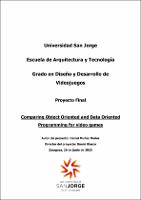Por favor, use este identificador para citar o enlazar este ítem:
https://repositorio.usj.es/handle/123456789/986
| Título : | Comparing Object Oriented and Data Oriented Programming for video games |
| Autor: | Muñoz Muñoz, Daniel |
| Palabras clave : | Design paradigms; Data-oriented design; Object-oriented design; Performance optimization; Game engine architecture; Game performance; Data locality; Cache optimization; Parallel processing; Code optimization; Code maintainability; code reusability. |
| Fecha de publicación: | 26-jun-2023 |
| Editorial : | Universidad San Jorge |
| Descripción : | Object-Oriented Programming (OOP) and Data-Oriented Programming (DOP) are two prominent design paradigms widely used in software development, including video game development. This research aims to compare these paradigms specifically in the context of the video game environment. OOP focuses on modeling systems as a collection of interacting objects, encapsulating data and behavior within classes. It promotes modularity, code reusability, and maintainability, making it suitable for various aspects of game development. In video games, OOP facilitates the creation of game entities such as characters, items, and environments and supports features like inheritance and polymorphism to manage complexity and enable efficient game object interactions. DOP, on the other hand, emphasizes organizing and optimizing data for efficient processing. It seeks to maximize data locality, minimize cache misses, and exploit parallelism for performance gains. DOP techniques are particularly beneficial in in-game scenarios where data-oriented optimizations such as physics simulations, AI processing, and rendering can significantly improve performance. Through this comparative analysis, the research aims to provide insights into the trade-offs and suitability of OOP and DOP in different aspects of video game development. By understanding their relative merits, developers can make informed decisions regarding the choice of design paradigm based on the specific requirements and constraints of their game projects. This study focuses on a case study representing a characteristic idiosyncrasy of a video game to conduct comparisons by developing a prototype video game using both OOP and DOP approaches.The results show that projects, where performance is essential, can benefit significantly from DOD, while it does not impact small or medium-sized projects as much. The current literature and educational offer are more oriented toward OOD training than DOD. Therefore, the mass adoption of DOD by the community will depend on whether said balance changes due to its successful use in industrial products and research works, along with which this research tries to contribute. |
| URI : | https://repositorio.usj.es/handle/123456789/986 |
| Aparece en las colecciones: | Grado en Diseño y Desarrollo de Videojuegos |
Ficheros en este ítem:
| Fichero | Descripción | Tamaño | Formato | |
|---|---|---|---|---|
| Comparing Object Oriented and Data Oriented Programming for video games.pdf | 5,26 MB | Adobe PDF |  Visualizar/Abrir |
Este ítem está sujeto a una licencia Creative Commons Licencia Creative Commons

